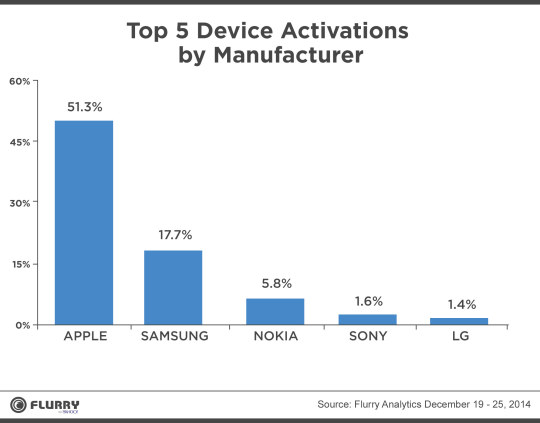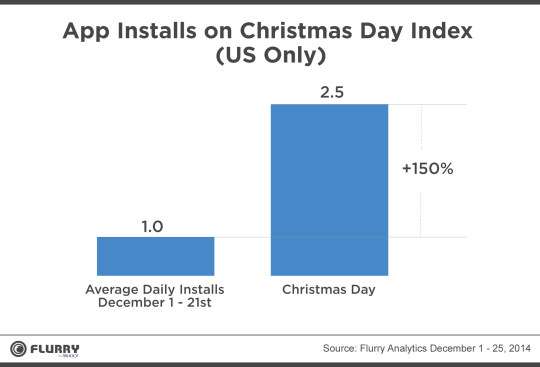December 29, 2014 | Jarah Euston
Millions of people woke up and unwrapped a shiny new device under the Christmas tree. As we have done in years past, Flurry examined these new device activations to understand what types of devices consumers are exchanging for the holidays, and with which types of apps they are filling them. Since the beginning of the mobile revolution, Christmas Day has seen the highest number of new device activations and app installs each year, and 2014 was no exception. Flurry examined data from the more than 600,000 apps we track to understand what was under the Christmas tree and which apps we downloaded as soon as the wrapping paper was taken off.
More Likely Than Not, Santa Brought an Apple Device

It’s clear that Santa is no longer into cookies - he prefers Apples. It was a banner Christmas for the Apple, the company that started the mobile revolution with the introduction of the first iPhone in 2007. Seven years later, Apple accounted for 51% of the new device activations worldwide Flurry recognized in the week leading up to and including Christmas Day (December 19th - 25th). Samsung held the #2 position with 18% of new device activations, and Microsoft (Nokia) rounded out the top three with 5.8% share for mostly Lumia devices. After the top three manufacturers, the device market becomes increasingly fragmented with only Sony and LG commanding more than one percent share of new activations on Christmas Day. Up-and-comers Xiaomi, Huawei, and HTC all had less than one percent share on Christmas Day. One reason is surely their popularity in Asian markets where December 25th is not the biggest gift-giving day of the year.
To put this in perspective, for every Samsung devices that was activated, Apple activated 2.9 devices. For every Microsoft Lumia device activated, Apple activated 8.8 devices. While, the holidays in general and Christmas in particular are not the sole indicator of the smartphone market share and trends, it is safe to say that Apple’s newly released iPhone 6 and iPhone 6 Plus have had a blockbuster holiday season, despite a lackluster holiday season for the consumer electronics industry.
Christmas Traditions: Eggnog, Gingerbread, and App Installs

The App Industry continued with its tradition of witnessing the largest numbers of App Installs on Christmas Day. With a new device, we’re all likely to turn into install addicts. This year, and on Christmas Day in the US, Flurry tracked 2.5x the number of app installs as compared to an average day in the first three weeks of December. This is a remarkable number considering the maturity of the US market and the difficulty of getting recognized in crowded app stores. Perhaps unsurprisingly, games and messaging apps saw the highest increase in app installs on Christmas Day as we sought entertainment and connection with friends and family.
The Christmas Quest for the Fitting Form Factor

Increasingly the new device market is being driven less by smart device adoption and more by consumers finding the form factor that works for them. Christmas 2014 saw a big jump in the number of phablets activated. As we reported in September (pre-iPhone 6 Plus), phablets were gaining share. This Christmas, it appears even more consumers are switching to the larger phone now that there is an iOS option. In the week leading up to Christmas, 13% of new device activations were phablets compared to just 4% in 2013. In fact, the iPhone 6 Plus was one of the top 5 devices Flurry saw activated for Christmas; the iPhone 6 was #1. The phablet’s popularity seems to come at the expense of full-sized tablets and to a lesser extent small tablets. App developers should take into account the fact that larger screens are becoming the primary device; it’s not just the secondary primetime tablet anymore. Even so, the medium-sized phone is still favored by most consumers and saw the largest share of device activations this Christmas.
Looking Ahead to 2015, and Back at the Year that Was
If Christmas is a bellwether for the year ahead, we should expect strong performance from iOS devices and a continued shift to the once-derided phablet form factor. This was the year that time spent on mobile finally eclipsed TV, and the data shows that we are spending this time in more apps than ever. It was another record year for app developers, and we don’t see any signs of the momentum stopping.
Stay tuned for our annual year-in-review report in the coming days.